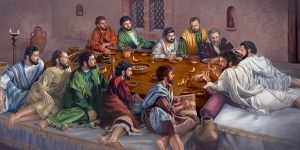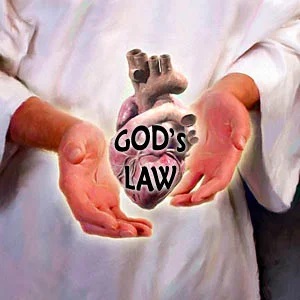A continuation of the Jeremiah series
One of the last things Jesus said before he ascended back to heaven, he assured his followers that he would be with them all the days until the conclusion of the system, or  the end of the age as some translations word it. On another occasion, Jesus said that where two or three were gathered in his name he would be in their midst.
the end of the age as some translations word it. On another occasion, Jesus said that where two or three were gathered in his name he would be in their midst.
Think of it, Jesus is invisibly present among those whom he recognizes as belonging to him. It has been that way since Jesus founded his congregation nearly 2,000 years ago. Logically, we ought to expect something more than what has always been when Jesus comes alongside his disciples to minister to them, which is what is implied with what is called the parousia of Christ.
The fact that Jesus is in the midst of the congregation prior to his coming is significant. Returning to the 30th chapter of Jeremiah, speaking to his servant Jacob, God says: “His majestic one will be one of his own, and from his midst his ruler will emerge. I will cause him to come near, and he will approach me. For otherwise, who would dare to approach me?” declares Jehovah. (Verse 21)
 Can you imagine an imperfect human daring to come into the presence of God, assuming such a thing were possible? It would not turn out well.
Can you imagine an imperfect human daring to come into the presence of God, assuming such a thing were possible? It would not turn out well.
Jesus was born into an Israelite family. Specifically, he emerged from the tribe of Judah, which meant he was entitled to the throne of David, King of Israel with whom Jehovah made a covenant for an everlasting kingdom. But Jesus resolutely refused to be made king of Israel and the prophecy of Jeremiah is not speaking of Christ’s earthly course. As stated in previous articles in this series, the fulfillment of the prophecy concerning Jacob’s time of trouble is in the final part of the days. That is what is stated in the last verse of the 30th chapter: “In the final part of the days you will understand this.”
 So, the “majestic one” who emerges as the ruler is in reference to Jesus who will emerge from the midst of his disciples, where he has been a silent overseer of his congregation up until the conclusion of the system, also known as the final part of the days.
So, the “majestic one” who emerges as the ruler is in reference to Jesus who will emerge from the midst of his disciples, where he has been a silent overseer of his congregation up until the conclusion of the system, also known as the final part of the days.
It is true, Jesus came near to Jehovah after he ascended to heaven, before even the Christian congregation came into existence on Pentecost 33 CE. But as the prophecies indicate Jesus must sit at the Father’s right hand until the time when God extends the sacred scepter to him. Elsewhere in prophecy, specifically in the seventh chapter of Daniel, the vision reveals someone like a son of man gaining access to the Ancient of Days during the climactic phase when a small horn emerges from the beast to war against the holy ones. As stated in Jeremiah regarding understanding coming in the final part of the days, likewise, the book of Daniel is sealed up until the time of the end.
Reminding the reader that the original Scriptures were not divided into chapters and verses, the next chapter opens, saying: “At that time,” declares Jehovah, “I will become God to all the families of Israel, and they will become my people.”
“At that time” being “in the final part of the days when you will understand this.” The 31st chapter of Jeremiah is God’s promise of restoration, and  He beautifully expresses His love and commitment to fulfilling His promises and covenant. What a joyous scene Jehovah describes: “At that time the virgin will dance joyfully, also the young men and the old men together. I will change their mourning into exultation. I will comfort them and give them joy instead of their grief.” – Jer. 31:13
He beautifully expresses His love and commitment to fulfilling His promises and covenant. What a joyous scene Jehovah describes: “At that time the virgin will dance joyfully, also the young men and the old men together. I will change their mourning into exultation. I will comfort them and give them joy instead of their grief.” – Jer. 31:13
But since literal Israel long ago ceased from being God’s people in reality the prophecy applies to Christians—specifically, anointed Christians who are members of the spiritual “Israel of God.” It is they who are destined to be punished to the proper degree—not exterminated.
Now consider verses 31 and 32: “Look! The days are coming,” declares Jehovah, “when I will make with the house of Israel and with the house of Judah a new covenant. It will not be like the covenant that I made with their forefathers on the day I took hold of their hand to lead them out of the land of Egypt, ‘my covenant that they broke, although I was their true master,’ declares Jehovah.”
As all of Jehovah’s Witnesses surely know, Jesus initiated the new covenant with his 11 faithful apostles on the Passover of 33 C.E. But keep in mind the context of Jeremiah situates this as taking place in the final part of the days. To understand how the promise of a new covenant with the sons of Israel is fulfilled during the final part of the days we must understand that although Jesus instituted the new covenant when Christianity  began it has not accomplished what God had intended. After all, the apostles with whom Jesus concluded the new covenant, as well as his covenant for a kingdom, have been dead for nearly 20 centuries. Contrary to the Watchtower’s error concerning the first resurrection having already begun, the fact of the matter is that Christ has not begun ruling in the Kingdom of God and the apostles and every other anointed Christian who has ever lived and died remain asleep in death up to this very moment.
began it has not accomplished what God had intended. After all, the apostles with whom Jesus concluded the new covenant, as well as his covenant for a kingdom, have been dead for nearly 20 centuries. Contrary to the Watchtower’s error concerning the first resurrection having already begun, the fact of the matter is that Christ has not begun ruling in the Kingdom of God and the apostles and every other anointed Christian who has ever lived and died remain asleep in death up to this very moment.
Worse, those who bear the name of Jehovah in this period are not exactly as they should be. That is why Jehovah is obligated to punish the covenant breakers to the proper degree. There is no way to avoid it. Did not Jesus even say that the faithful and discreet slave who errors in ignorance will be lashed with a few strokes?
So, the rehabilitation of “Israel” and their return to Zion is what will take place in the future, after God cuts short the tribulation on account of the chosen ones.
Now consider the rest of the passage: “For this is the covenant that I will make with the house of Israel after those days,” declares Jehovah. “I will put my law within them, and in their heart I will write it. And I will become their God, and they will become my people. And they will no longer teach each one his neighbor and each one his brother, saying, ‘Know Jehovah!’ for they will all know me, from the least to the greatest of them,” declares Jehovah. “For I will forgive their error, and I will no longer remember their sin.” – Jeremiah 31:33,34
 What is the Watchtower Bible and Tract Society? It is a corporation that has been devoted to teaching people about God’s purpose, essentially, to know Jehovah. No one can deny that. For all of their shenanigans, especially of late, the Watchtower has taught millions of people to know Jehovah. And that presents an enormous, glaring contradiction, one of many, many, inherent in the Watchtower’s prophetic interpretation. How so? Because as stated above, the purpose of the new covenant is to bring people to know Jehovah. No, not just His name and the things He has done in the past, but to really, personally, fully, know Jehovah as a Father.
What is the Watchtower Bible and Tract Society? It is a corporation that has been devoted to teaching people about God’s purpose, essentially, to know Jehovah. No one can deny that. For all of their shenanigans, especially of late, the Watchtower has taught millions of people to know Jehovah. And that presents an enormous, glaring contradiction, one of many, many, inherent in the Watchtower’s prophetic interpretation. How so? Because as stated above, the purpose of the new covenant is to bring people to know Jehovah. No, not just His name and the things He has done in the past, but to really, personally, fully, know Jehovah as a Father.
 The consummation of the new covenant makes the teaching work of the Watchtower unnecessary, even obsolete. What that means in reality, God has not forgiven our error yet. He has not put our sins out of His mind. Nor has He written His law on our hearts yet. Nor has Jehovah become our God, nor we His people. When will these things occur? Excuse the repetition: “In the final part of the days you will understand this.”
The consummation of the new covenant makes the teaching work of the Watchtower unnecessary, even obsolete. What that means in reality, God has not forgiven our error yet. He has not put our sins out of His mind. Nor has He written His law on our hearts yet. Nor has Jehovah become our God, nor we His people. When will these things occur? Excuse the repetition: “In the final part of the days you will understand this.”



